These are 32 snacks you should avoid on a healthy diet
Want to upgrade your nutrition? Beware of the snacks you should avoid when you're feeling hungry...
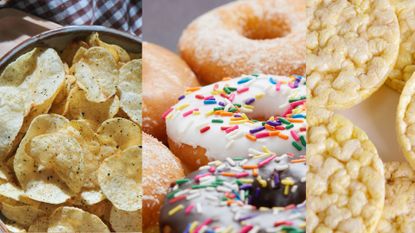

Want to know about the key snacks you should avoid? We are often informed of the groceries we need to be getting enough of as part of a nutritious, balanced diet - but it's easy to forget about the foods that can be harmful to our bodies.
It's not that you should cut items out of your diet forever - because categorising snacks into 'good' and 'bad' can be detrimental to maintaining a healthy relationship with food. But there are certain things that should be enjoyed in moderation, rather than as a regular part of your daily routine, particularly if you're considering what to snack on when dieting.
As you'll find out, it's best to swerve snacks high in added sugars, unhealthy fats and excessive sodium. Instead, try to opt for whole foods like fruits, vegetables, nuts and seeds - including fuelling up on the high-protein low-calorie foods - which provide essential nutrients and support overall health. Are any of these in your kitchen cupboards?
32 snacks you should avoid
1. Crisps
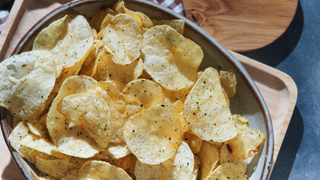
Reaching for a bag of crisps might be convenient if you're feeling peckish, but there are a few reasons why you should swerve them where you can. Firstly, they are typically high in unhealthy fats - such as trans fats and saturated fats - which can raise cholesterol levels and increase the risk of heart disease.
What's more, regardless of the flavour you choose, they also tend to contain a lot of sodium, which contributes to high blood pressure and fluid retention. Then there's the fact that they are high in calories - which is something to consider if healthy, sustainable weight loss is your goal.
2. Rice cakes
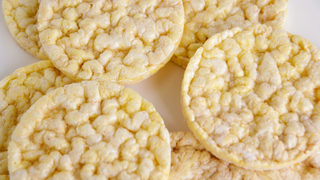
Rice cakes are often marketed as a 'healthy' versatile snack, ready to be jazzed up with a topping of your choice. However, they aren't quite what they seem - because they are high in refined carbohydrates, which can cause blood sugar levels to spike quickly and may lead to energy crashes.
They are also often low in fibre and protein, which means they may not keep you feeling full for long - risking you wanting to snack more. Some varieties may also contain added sugars or salt.
Sign up for the woman&home newsletter
Sign up to our free daily email for the latest royal and entertainment news, interesting opinion, expert advice on styling and beauty trends, and no-nonsense guides to the health and wellness questions you want answered.
3. Flavoured yoghurt
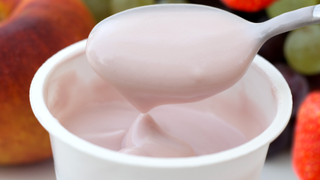
While flavoured yoghurts may seem like a good option to snack on between main meals, they often come packed with added sugar and artificial flavourings. There is evidence that these additives can raise the calorie content.
Further still, unlike Greek yoghurt or other plain types, they may lack probiotics that have been found by research to be key to gut health. Additionally, some varieties may have a lower protein content, causing you to miss out on muscle-boosting and fullness-aiding benefits.
4. Protein bars
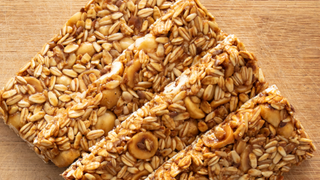
Protein bars are often marketed as a nutritious snack choice thanks to their higher levels of the key macronutrient. However, one big downside is the fact that shop-bought ranges are usually highly processed - frequently containing added sugars, artificial sweeteners and unhealthy fats.
What's more, some protein bars may also have high levels of carbohydrates, which can cause spikes in blood sugar levels - especially if they are not balanced with enough fibre and protein. This can cause them to not be as satiating as some other whole-food snacks.
5. Sweets
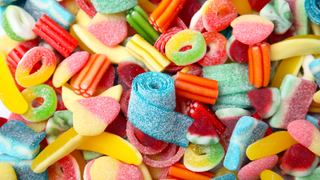
They are a tempting quick fix, but sweets should only be a very occasional part of your diet. This is mainly because, as you are probably aware, they are typically high in added sugars and low in nutritional value due to a lack of essential vitamins and minerals.
Eating them can lead to rapid spikes and crashes in blood sugar levels, which can contribute to feelings of fatigue, irritability and cravings for even more sugar. However, as well as these short-term effects, research has also linked them to a long-term increased risk of obesity, type 2 diabetes and dental issues.
6. Chocolate
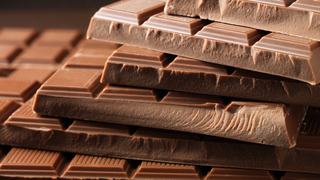
Chocolate has long been a popular sweet treat - but there are several reasons why you should keep consumption to a minimum. Milk varieties often contain high amounts of sugar and saturated fats, as well as additives and preservatives that can be harmful to health when consumed in large quantities.
This contrasts with dark varieties, which research has found may have nutritional benefits due to their richer antioxidant levels. This is why you should look out for a higher cocoa content - 70% or more - where possible.
7. Cereal
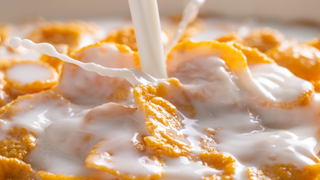
Pouring yourself a bowl of the breakfast staple might seem like a quick way to keep hunger at bay. However, many cereals serve up high levels of added sugar and refined carbohydrates - which can lead to rapid spikes and crashes in blood sugar levels, contributing to feelings of hunger and fatigue shortly after eating.
Additionally, depending on which box you choose, they may lack sufficient amounts of protein and fibre, which are essential for feeling full and maintaining steady energy levels. Some may also contain artificial colours, flavourings and preservatives, which research has found can have negative effects on overall health when consumed regularly.
8. White toast
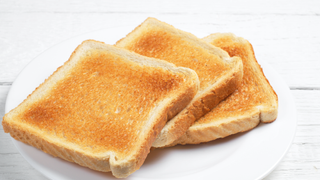
A slice of toast is a go-to snack - but it could be impacting your healthy diet. If you use white bread, it is made from refined flour, meaning it has been stripped of most of its fibre and nutrients during processing. This leaves it with a high glycemic index, causing a rapid spike in blood sugar levels when you eat, which is then followed by a quick drop that can trigger further feelings of hunger.
Additionally, because of the processing, white bread lacks the fibre found in whole grain options, which is key for digestive health and regulating those aforementioned blood sugar levels. The lower fibre content also means it's less satiating compared to whole-grain bread.
9. Biscuits
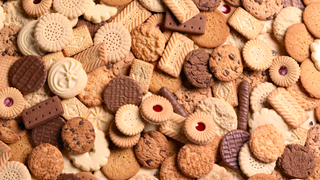
They are a common addition to an afternoon tea break, but avoid snacking on biscuits where possible. They are typically high in refined carbohydrates, sugars and unhealthy fats - and there's evidence that these components can increase cholesterol levels and the risk of heart disease.
Biscuits can also be high in calories without providing substantial nutritional value. Indeed, they are usually low in fibre and protein, both of which are important for satiety and maintaining steady blood sugar levels.
10. Crackers
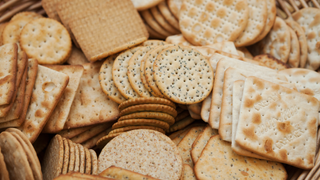
Because they are not particularly sweet, crackers may seem like a better snack choice, especially because they can be topped with a variety of ingredients. However, they often lack nutritional value due to their high refined carbohydrate content and low fibre levels.
Indeed, they are low in protein and healthy fats, making them less filling and more likely to spike blood sugar levels. They can also be high in sodium and may contain added sugars or unhealthy fats.
11. Ice-cream
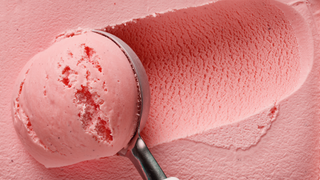
There's nothing like stopping off for an ice cream on a hot day - however, avoid making it a regular occurrence. Regardless of flavour, it tends to be high in sugar and calories.
Further still, ice cream is also high in saturated fats, which research has found can raise cholesterol levels and potentially lead to heart disease. There is also a lack of essential vitamins, minerals and fibre - offering little nutritional value - and some varieties also may contain artificial additives and preservatives.
12. Cake
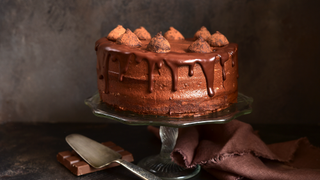
Leave cake for special occasions like birthdays. Routinely nibbling on a slice can negatively impact your health, since the dessert is typically high in sugar, unhealthy fats and refined carbohydrates - which can lead to spikes in blood sugar levels followed by crashes - causing feelings of fatigue and cravings for more sugary foods.
What's more, cake often lacks essential nutrients like fibre, vitamins and minerals - serving up empty calories without providing significant nutritional benefits. Then there's the fact that some may contain artificial additives, preservatives and trans fats.
13. Pastries
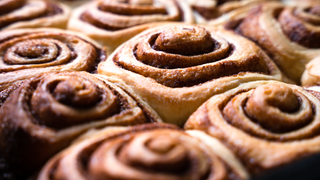
Pastries - such as cinnamon buns and croissants - may seem like an easy snack to pick up on your coffee break, but you shouldn't make eating them a habit. They often contain trans fats and saturated fats, which can raise cholesterol levels and increase the risk of heart disease.
Additionally, pastries tend to be calorie-dense and lack essential nutrients like fibre, vitamins and minerals. Additionally, their high sugar content may lead to energy crashes, which certainly won't help you tackle that afternoon to-do list.
14. Halloumi fries
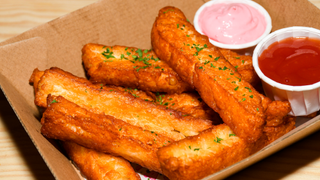
While the Greek cheese can be a tasty addition to a meal, halloumi fries - often served as a snack in restaurants - are usually deep-fried, which increases their calorie and fat content significantly.
Halloumi fries are often high in saturated fats and sodium, which can contribute to heart disease and high blood pressure. They also lack essential nutrients such as fibre, vitamins and minerals - making them something to enjoy only occasionally when dining out.
15. Salted nuts
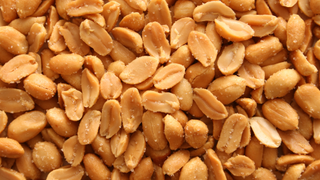
Nuts are often presented as a healthy snack - as long as they're not of the salted variety. This is because excessive sodium intake can lead to high blood pressure, which is a risk factor for heart disease and stroke.
Additionally, while nuts themselves are nutritious and rich in healthy fats, protein, and fibre, the added salt in some kinds can potentially lead to over-consumption. Choosing unsalted or lightly salted nuts allows you to enjoy their health benefits without the drawbacks of excessive sodium intake.
16. Vegetable crisps
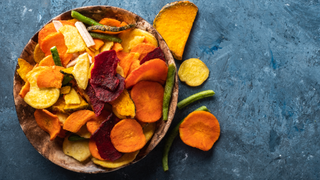
Don't be fooled that vegetable crisps are as healthy as they first seem. They are often fried or baked in unhealthy oils, which can increase their calorie and fat content. This means that despite being made from vegetables, consuming them too frequently can raise cholesterol levels and increase the risk of heart disease.
Additionally, vegetable crisps may contain added salt to enhance the flavour, leading to higher sodium intake - which can contribute to high blood pressure and other health issues. They also tend to lack the fibre and nutrients found in fresh vegetables, which is why consuming enough of the real deal is important.
17. Meat slices
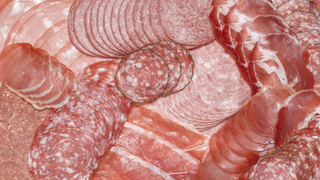
Whether ham or salami, eating slices of meat from a charcuterie board should be kept to a minimum. This is because they can be high in unhealthy fats - depending on the type of meat and how it is processed - and high consumption has been linked to increased cholesterol levels and a higher risk of heart disease.
Additionally, processed meat slices often contain added sodium and preservatives, which can contribute to high blood pressure and other cardiovascular issues. What's more, some processed meats may contain nitrites and nitrates, which are compounds that research has linked with an increased cancer risk.
18. Pretzels
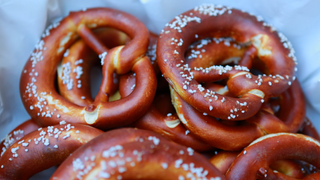
Pretzels should be a snack enjoyed from time to time. They are high in refined carbohydrates, leading to rapid spikes in blood sugar levels that can increase hunger and cravings.
What's more, they are low in fibre, which means they do not provide lasting satiety and may contribute to overeating. The high sodium levels can also elevate blood pressure and pose risks to heart health.
19. Nutella
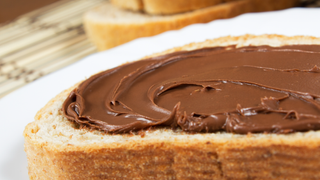
It is a popular snack topping, but the sweet spread isn't something to consume on the regular. This is because it primarily consists of sugar and palm oil, which are its main ingredients after hazelnuts and cocoa, leading it to contain high amounts of sugar and unhealthy fats.
Nutella is also low in protein and fibre, which are essential for satiety and maintaining steady blood sugar levels. Meanwhile, its sugary nature can cause rapid spikes and crashes in blood glucose levels, leading to increased cravings and energy crashes.
20. Fizzy drinks
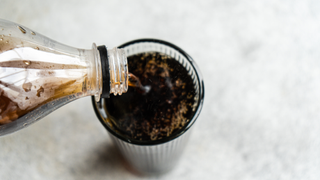
Reaching for a fizzy drink - either on its own or with some food - is a popular feature of many snack breaks. However, whether cola or lemonade, they are typically high in sugar or artificial sweeteners.
Regular consumption of fizzy drinks has been linked by research to an increased risk of type 2 diabetes, heart disease and dental problems. Even diet or zero-calorie versions, which contain artificial sweeteners, may have negative effects on metabolism and appetite regulation.
21. French fries
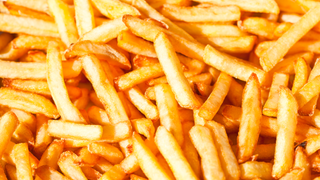
French fries can make a yummy snack when you're dining out, but they are often deep-fried in unhealthy oils, which increases their calorie and fat content significantly. These oils may contain trans fats or excessive amounts of saturated fats, which can raise cholesterol levels and increase the risk of heart disease.
They are also high in refined carbohydrates, which can lead to rapid spikes in blood sugar levels and subsequent crashes, leaving you feeling hungry shortly after consuming them. Additionally, there's evidence that the frying process can produce harmful compounds like acrylamide, which is a potential carcinogen.
22. Pizza
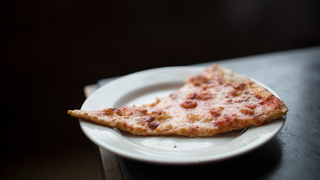
Picking up a pizza slice - whether as a leftover from your fridge or on the go - is something to do only occasionally. This is because the dish is typically high in calories, unhealthy fats and sodium.
Sometimes, it's down to particular ingredients. For instance, processed meats like pepperoni or sausage - which are high in saturated fats and sodium - can contribute to elevated cholesterol levels and increased risk of heart disease. Similarly, the cheese on pizza can also be high in saturated fats and calories.
23. Coffee
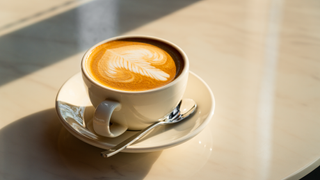
Where possible, avoid using your coffee as a snack. While, in moderation, it can be part of a healthy diet for many, excessive consumption can lead to issues like jitteriness, anxiety and disrupted sleep patterns, particularly when consumed later in the day.
What's more, coffee's acidity may exacerbate digestive problems or worsen acid reflux for some people. Additionally, adding sugar, flavoured syrups or certain milks or milk alternatives, can increase calorie intake.
24. Chicken nuggets
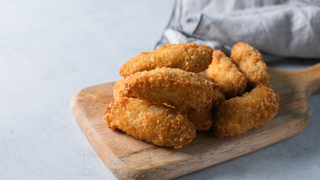
Chicken nuggets are a snack that should be enjoyed only from time to time. They are often heavily processed and high in unhealthy fats, sodium and calories, and they also tend to contain additives, preservatives and fillers to enhance their flavour and texture.
Since they are also usually deep-fried in oils that may contain trans fats, eating too many chicken nuggets can raise cholesterol levels and increase the risk of heart disease. The fact they also generally lack essential nutrients is another reason to keep consumption to a minimum.
25. Cookies
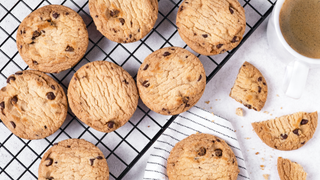
If you're after something sweet, cookies can be a go-to snack - but beware of their health effects. They often contain added sugars and unhealthy fats, which can raise cholesterol levels and increase the risk of heart disease.
Additionally, consuming them regularly can lead to energy crashes and cravings for more sugary foods due to their high glycemic index.
26. Milkshake
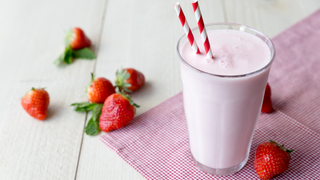
Whether strawberry or banana flavour, milkshakes may be a less-than-ideal regular snack. They are often made with ice cream, whole milk or cream, all of which are rich in saturated fats that can raise cholesterol levels and increase the risk of heart disease.
Additionally, milkshakes tend to be loaded with added sugars. Drinking them regularly can lead to excessive calorie intake without providing essential nutrients like vitamins, minerals or fibre.
27. Doughnuts
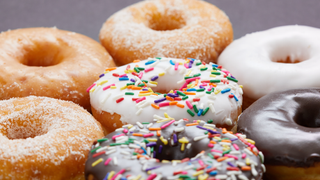
Doughnuts are typically high in unhealthy fats, sugar and refined carbohydrates. They are generally deep-fried in oils that may contain trans fats, which can raise cholesterol levels and increase the risk of heart disease.
They are also often loaded with added sugars. Consuming them regularly can lead to energy crashes and cravings for more sugary foods due to their high glycemic index.
28. Hot dog
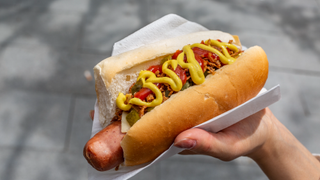
They may be delicious, but hog dogs are a snack that should generally be avoided. Often the sausage is made from meat packed with additives, preservatives and high levels of sodium.
Furthermore, hot dogs tend to be high in saturated fats and calories. Their processed nature means they lack essential nutrients and fibre found in whole, unprocessed foods.
29. Fruit juice
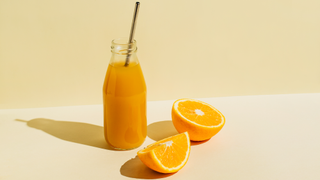
Fruit juice can be an important addition to a healthy diet, and drinking it in moderation provides essential nutrients. However, when fruit is juiced, it loses the fibre content found in whole fruits - which helps to slow down the absorption of sugars and contributes to feelings of fullness - meaning it can cause rapid spikes in blood sugar levels, similar to sugary beverages.
This can lead to increased hunger shortly after consumption and may contribute to weight gain and insulin resistance over time. Additionally, some varieties may contain added sugars or sweeteners, further increasing their calorie content.
30. Burger
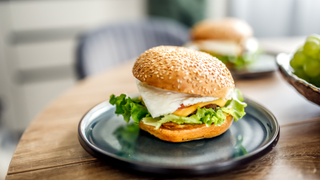
There are several reasons why burgers do not make an ideal snack. They typically contain a beef patty that may be high in saturated fats, which can raise cholesterol levels and increase the risk of heart disease.
Additionally, burgers are often served with high-calorie toppings - like cheese, bacon, and mayonnaise - further adding to their calorie content. The refined carbohydrates in burger buns may also cause spikes in blood sugar levels.
31. Trail mix
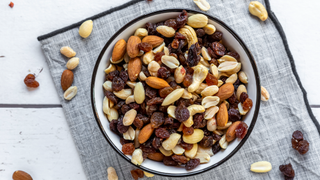
Trail mix often contains nuts, seeds and dried fruits. While these are nutritious and rich in healthy fats, protein and fibre - leading it to be widely considered a 'healthy' snack - they are also calorie-dense.
What's more, sometimes there can be chocolate or sweets added in. This can increase the sugar content, which research has found can lead to energy crashes and cravings for more sweet items.
32. Sandwich
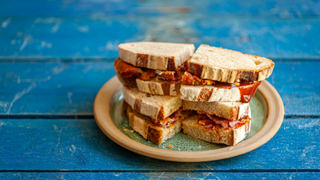
Snacking on a sandwich is a popular choice. However, depending on the filling, they can be high in refined carbohydrates, unhealthy fats, sodium and calories.
Additionally, sandwich breads are often made from refined grains, lacking the fibre and essential nutrients present in whole grains. What's more, condiments such as mayonnaise or sauces can add extra calories, unhealthy fats and sodium.
Lauren is a freelance writer and editor with more than six years of digital and magazine experience. In addition to Womanandhome.com she has penned news and features for titles including Women's Health, The Telegraph, Stylist, Dazed, Grazia, The Sun's Fabulous, Yahoo Style UK and Get The Gloss.
While Lauren specializes in covering wellness topics—ranging from nutrition and fitness, to health conditions and mental wellbeing—she has written across a diverse range of lifestyle topics, including beauty and travel. Career highlights so far include: luxury spa-hopping in Spain, interviewing Heidi Klum and joining an £18k-a-year London gym.
-
 Times the royals sent subtle messages with their outfits
Times the royals sent subtle messages with their outfitsWhen it comes to the Royal Family's fashion choices, there's usually more to it than meets the eye
By Jack Slater Published
-
 These 9 nude Christmas manicures are guaranteed to bring chic festive cheer
These 9 nude Christmas manicures are guaranteed to bring chic festive cheerFor festive but not tacky nail looks, these neutral designs are perfect for celebrating the holidays in (subtle) style...
By Naomi Jamieson Published